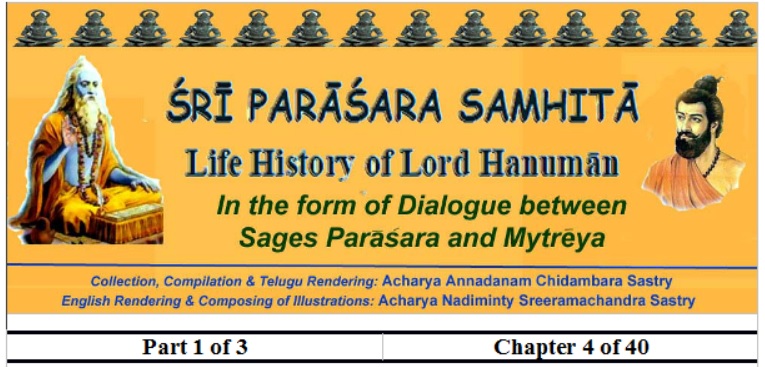

4th Chapter (Caturtha Paţalah)
History of Sōmadatta – Hymns of Praise of Āñjanēya by Nīla
(Sōmadattacaritam – Nīlakrtahanumatstōtram)
मैत्रेय: –
श्लोक:
हनुमदव्रतमित्युक्तं पूर्वाध्याये त्वया मुने
केन चादौ पुराचीर्णं तत्फलं वद मे विधिम्।। 1
Mytrēya:
Oh! Great sage Parāśara! The observance of Hanumān ritual (Hanumadvrata) was explained by you in the last Chapter (Paţala). Pray, tell who all that earned its fruits previously are.
श्रीपराशर:-
अत्रानुवर्णयिष्यामि कथां पापप्रणाशिनीम्
यां श्रुत्वा मानवो नित्यं हनुमद्र्क्तिमान् भवेत्।। 2
Parāśara:
I will narrate that sin-removing story that makes man a devotee of Hanumān by listening it daily.
सोमदत्तो महानासीत्पुरा सोमकुलोद्रव:
राजा परमधर्मज्ञो बंधुमाननहंकृति:।। 3
Sōmadatta:
Once lived a great lunar-dynasty King named Sōmadatta, who knew all virtues, had many relatives and was free of ego.
सत्यवादी सदामौनी ह्मतिथेयो बहुव्रत:
सत्सु पूजां प्रकुर्वाण: किं नु शत्रुपराक्रमै:।। 4
He always spoke truth only, never talkative like a saint, respected guests and good people, and was valorous.
बुभुजे भुवमव्यग्र: स रत्नाकरमेखलाम्
तेन संपीडिता राज्ञा समेता: शत्रव: परे।। 5
He ruled a vast kingdom peacefully. He always conquered the enemies. All such enemies got together
माहिष्मतीपुरं याता: तैराहूतो रणे तु स:
अक्षौहिणीसहस्त्रौश्च ह्मायुतै: करिणां घटै:।। 6
And have gone to Mahişmatīpuram (capital of Sōmadatta) and invited him to war. With thousands of Complete Armies (= akşouhiņis – 21,870 elephants, 21,870 chariots, 65,610 horses and 109,350 infantry), 10,000 elephant cavalry force,
अश्वै: काश्मीरजैस्तैस्तु लक्षकोटिसमन्वितै:
संग्रामस्तुमुलस्तस्य सोमदत्तस्य तैरभूत्।। 7
A billion Kashmir horse cavalry force that Sōmadatta had to carry out a terrific fight against.
शक्तितोमरखड्गैश्च भिंडिपालैस्तदाश्मभि:
यथा दैवासुरं युद्धं तथाभूत्किंनु वर्ण्यते ।। 8
Using lances, javelins, swords, axes, stone and other weapons the indescribable war went on like the wars between gods and demons. How can it be described?
परैर्हतबलस्संख्ये निशि संगृह्ना देविकाम्
स्त्रियमंत:पुरात्तस्मात्प्रागात्गाग्र्याश्रमं प्रति।। 9
Defeated by the enemies, Sōmadatta, along with his queen, left the palace and reached the hermitage of sage Gārgi.
तत्रैव पंचमासास्तु स्थित्वा शोकसमन्वित:
पंगुत्वमपि मूकत्वमंधत्वमगमन्नृप:।। 10
There he lived for five months with grief. Gradually he became lame, mute and blind.
राज्यभ्रष्टं पतिं धीरा प्राप्तुकामं पुन: प्रियम्
प्रलपंतं मुहु: पुत्रान् हतान् युद्धे सुदुर्लभान्।। 11
Sōmadatta’s Wife:
His brave wife, by her sad and dethroned husband, always thinking about reacquiring happiness, their children lost in the war and difficult to acquire
श्रियं राज्यं च भोगं च समुद्दिश्य पुन: पुन:
आश्वासयंती सा देवी जगौ श्लोकचतुष्टयम्।। 12
Wealth, kingdom and delights; consoling him again and again, told him four poems (hymns).
धैर्यं विपत्तौ कर्तव्यं संपत्तौ च क्षमा परा
वाचालत्वं सभामध्ये तद्वै शास्त्रपुरस्सरम्।। 13
One should be good at being brave amidst dangers, patient for wealth, arguing well about scriptures in assembly of scholars,
विक्रमो युधि कर्तव्य: स्थिरत्वं स्त्रीसमीपत:
ऐश्वर्ये च तथा क्षांतिर्भक्तिश्शश्वत्तु भूसुरे।। 14
One should be valorous during war, even minded amidst ladies, patient while wealthy and devoted towards Brāhmins.
भवितव्यं भवत्येव नारिकेलफलांबुवत्
गंतव्यं गच्छति सदा गजभुक्तकपित्थवत्।। 15
Things that have to happen will happen; even if one does not wish so. It’s like water accumulating inside a coconut in time, though no one pours it! Things that have to go will go. It’s like a woodapple eaten by an elephant and voided out empty without its inner pulp (digested by the elephant); the inner stuff just disappears.
यद्रावि तद्व्रवत्येव यदभावि न तद्रवेत्
इति निश्चितबुद्धीनां न चिंता बाधते क्वचित्।। 16
That that has to happen will definitely happen. That that cannot happen will never happen. Those who know this will never worry over happenings.
एवं मनीषिण:प्राहुर्नीतिशास्त्रविदो नृप
मुंच शोकं च मोहं च चिंतां देहविनाशिनीम्।। 17
Experts in moral precepts tell so. So, Oh! King! Stop grieving, leave longing for and debilitating worry over what was lost.
गाग्र्याश्रमो यं राजेन्द्र प्रापयिष्ये तदन्तिकम्
स ते दास्यति धर्मात्मा सर्वान्कामान्सुदुर्लभान्।। 18
Oh! King! This is the hermitage of sage Garga. We are approaching it. That pious seer can bestow even hard to fulfill wantings.
सांत्वयित्वा ततो वीरं नृपतिं राष्ट्रवर्जितम्
अशक्तं गमने देवी बिभ्रती निजकंधरे।। 19
So consoling her fugitive and powerless husband, supporting him on her shoulder as he was unable to walk.
प्रापयामास मुदिता गाग्र्याश्रममकल्मषम्
पतिं तत्र प्रतिष्ठाप्य मुनिं नत्वा पुन: पुन:।। 20
She led him to the pious and peaceful hermitage of sage Garga and, again and again respectfully bowing to the sage
कंपमाना तदा साध्वी पीनोन्न्तपयोधरा
चंद्रानना सुकेशी च बिंबोष्ठी मंजुभाषिणी।। 21
The accomplished, full-bosomed, moon-faced, long haired, plump pink lipped, sweet talking,
कर्णान्तनयना बाला चंद्रिका मलिनच्छवि:
देविका देविमध्या सा पंचविंशतिवार्षिका।। 22
Long eyed, radiant like pure moonlight, the 22 year old lady amidst ladies,
कोमलांगी तु सा देवी श्यामला चोत्पलेक्षणा
मुनिं प्रोवाच धर्मिष्ठा पाहि पाहीति मे पतिम्।। 23
Tender bodied, dark complexioned, trembling, lotus like, the lady requested the pious minded sage, “Save. Save my husband.”
भगवन्पतिना सार्धमागता शत्रुपीडिता
राज्यभ्रष्टो ह्रायं राजा त्वामेव शरणं गत:।। 24
Oh! Great Sir! I came with my husband who was beaten by enemies. This king is without his kingdom. He seeks only your protection
मुनिस्तत्र चिरं ध्यात्वा ध्यानमार्गेण चक्षुषा
दृष्टवा सर्वमेवैतद्राज्ञस्तस्य महात्मन:।। 25
Sage Gārga:
The sage then contemplated deeply and, through his inner eye, realized what all has happened.
उवाच मुनिशार्दूलो राजानं महिषीसखम् गर्गोवाच –
युवयो: कष्टमत्युग्रं सर्वाभावं सुदुस्सहम्।। 26
Then, the best among sages, Gārga said so about the queen’s dear husband. “The fate that has befallen you is terrible; bleak and unbearable”.
येनेदमीदृशं प्राप्तं तदब्रवीमि हिते धुना
सकृद्वाप्युत्तमा विद्या नोपास्ता विजयप्रदा।। 27
I will tell you why it so happened. The victory-bestowing mantra was not recited by you.
कृतानि न त्वया वीर ह्म्र्त्तमनि व्रतान्यपि
तस्मात्त्वमीदृशीं प्राप्तो गतिं दुरवबोधनाम्।। 28
Oh! King! No great rituals were followed by you. That is why you fell to this disgrace.
राजा उवाच –
उपासनाय विद्यानामशक्तो हं व्रतेषु च
यथाशक्त्या करिष्यामि तथापि भगवन्मुने।। 29
Sōmadatta:
“Oh! God! Sage Garga! I am poor at reciting mantras and performing rituals. But I will do to the best of my abilities (whatever you suggest).
सर्वमंत्रमहाराजविद्यामेकां फलप्रदाम्
श्रेष्ठं व्रतानां सर्वेषामेकं दीनाय मे वद।। 30
Please tell me, a humbled person, a mantra that is a king amongst mantras and the best one among the holy rituals.
वात्सल्यवन्तस्सर्वेषु यूयं दीनेषु सर्वदा
यद्यपि मयि कारुण्यं कुरु शिष्यो स्म्यनुग्रहम्।। 31
Your respected self is affectionate towards all. You always have compassion towards depressed individuals. I am becoming your obedient pupil; you kindly be compassionate towards me similarly.”
इत्युक्तस्तेन राज्ञाथ वृद्धगाग्र्यो महामुनि:
क्षणं ध्यात्वा नृपं प्राह श्रूयतामिह पुत्रक।। 32
Garga:
Hearing the narration of the king, elderly sage Garga meditated for a while and told the king, “Listen, my son.”
राजन्सकलविद्यानां सारभूतो हनूमत:
पंचवक्त्राख्य विद्यास्ति तां ददामि नृपोत्तम।। 33
Oh! King! There is a Five-faced Hanuman Knowledge known as Hanumatpanchvaktravidya that is like the essence of all types of Knowledge. Oh! Best amongst the kings, I will give you that
सद्यो दुरितराशिघ्नी सकलार्तिनिवारिणी
अनायासेन जयदा साम्राज्यफलदायिनी।। 34
That will remove all the sins right away. It neutralises every type of suffering. Gives victory easily. Gives kingdom.
तां जपस्व महाबाहो जयसिद्धिर्भविष्यति
अन्यच्च तव वक्ष्यामि व्रतं श्रीहनुमत्प्रभो:।। 35
Oh! Long-armed one! Recite this. You will achieve victory in no time. Please listen; I will narrate to you the Hanumān ritual.
सद्यस्समस्तफलदं सततं विजयप्रदम्।।
वैशाखे दशमीकृष्ण अमावश्या तत: परम्।। 36
Hanumatvrata (Hanuman Ritual):
It fulfills all needs soon. Always bestows victory. On the 10th day in the waning-moon fortnight (Kŗşņapakşa) or the following no-moon day of the Vaiśākha (2nd lunar) month,
माघादिपंचमासेषु एकस्मिन् शुक्लपक्षके
मंदवासर आद्यस्य तारं मृगशिरो भिधम्।। 37
Either on the first Saturday of the waxing moon (first) fortnight or day of the Mŗgaśiira star constellation (λ, φ Orionis) in the five months starting from Māgha month (the eleventh month – January/February – as per the Indian lunar calendar)
श्रावणे पौर्णमी चैव कार्तिके द्वादशी तथा
मार्गशीर्षे तथा शुक्ले संप्रोक्ता च त्रयोदशी।। 38
Or on the full-moon day of the Śrāvaņa month (5th of lunar calendar, Aug-Sept) or on the 12th day of the waxing moon fortnight of the Kārtīka month (8th month, October-November) or on the 13th day of the waxing moon fortnight of Mārgaśīrṣa month (9th month, Novemebr -December), this ritual has to be performed.
एतेषु दिवसेष्वेकदिवसे व्रतमाचरेत्
भक्तिमांश्चेत्सर्वदिनेष्विदं व्रतमथाचरेत्।। 39
The ritual can be performed on any one of the above mentioned days. Totally devotional ones can perform this ritual on all days.
एकस्मिन्तोरकं बद्ध्वा पूजामात्रं तत: परम्
कुर्याच्छीवायुपुत्रस्य दिवसेष्वपरेष्वथ।। 40
On the beginning day of the ritual one has to tie the holy ritual wrist band (Tōraņa – made of pure cotton thread with mango leaves knotted in) and then start the Hanumān worship ritual. There is no need to tie such a band on the succeeding days of this ritual.
ब्राह्मीमुहूर्ते सायं वा मध्याह्ने प्रातरेव वा
पूजयेदंजनासूनुं गुरोराज्ञापुरस्सरम्।। 41
Taking the Guru’s permission first, Hanumān worship has to be performed either at the auspicious time of commencement of dawn (brāhmīmuhūrta), in the evening time, in the afternoon or in the morning.
स्वर्णराजतताम्रेषु भूर्जे वा स्थंडिलें भसि
क्षौमे वा पूजयेद्धीमान्यंत्रे वा प्रतिमासु वा।। 42
Onto a holy round amulet (Yantra; Cakra) made of gold or silver or copper; or into the leaves of birch (bhūrjapatra) or into the rice-floor floral patterns drawn on the ground (rangōli) or into a vessel full of water (kalaś) or into a silk cloth or into idols Lord Hanumān has to be invocated and worshipped.
त्रयोदशग्रन्थियुक्तं धृत्वा तोरकमुत्तमम्
त्रयोदशघृतापूपवायनं तत्र दापयेत्।। 43
A holy ritual hand band with thirteen knots has to be worn. Thirteen rice-floor cakes fried in pure ghee have to be presented to the deity.
गुरुं संपूज्य वित्ताद्यैर्वित्तशाठ्यविवर्जित:
वित्तशाठ्यकृतं कर्म पुण्यं तन्निष्फलं भवेत्।। 44
The Guru has to be worshipped with lots of money. Miserliness in worshipping is fruitless.
ब्राह्मणैस्सह भुंजीयाद्यथाशक्ति समाहित:
त्रयोदश च वर्षाणि सिद्धिकामस्समाचरेत्।। 45
Spend satisfying time with Brāhmins and partake meals with them. Doing so for thirteen years will cause attainment of the wish.
अनेन सकलाव्म्छत्रून्दुर्धर्षानमरैरपि
विजित्य सुमहद्राज्यं चिरकालमवाप्स्यसि।। 46
By this you can win over toughest enemies, even over divine beings, and will regain and rule the kingdom for a very long time.
भवित्री पूर्वसंपत्तिस्तव श्री:कीर्तिसंयुता
अत्रार्थे संप्रवक्ष्यामि पूर्ववृत्तांतमद्भुतम्।। 47
Your past riches, fame and sons will be back. Meanwhile I will narrate you a wonderful past incidence.
विभीषणसुतश्श्रीमान्नीलो नाम महाबल:
सर्वविद्यासु निष्णातो नित्यं धर्मपरायण:।। 48
Vibhīşaņa’s (Rāvaņa’s pious younger brother) son named Nīla was very powerful, well versed and always performing good deeds.
स एकदा महाराजं विभीषणमरिन्दमम्
उवाच भगवन्नस्मिन्पुरे लक्ष्मीरचव्म्चला।। 49
Nīla:
One day Nīla observing the valorous Vibhīşaņa said so. “Oh! Lord! Our Lanka city is full of eternal riches (Lakşmīi).
त्वदधीनं महाराज्यमिदं लड्कापुरस्य ते
धनधान्याकुलं सर्वमपि भोगसमन्वितम्।। 50
This Lanka city under your control being rich in money and food grains is full of all delights.
अनर्घमुक्तारत्नाद्यैर्दिव्यजांबूनदादिकै:
इदं पुरं च राष्टं च सुखसंपत्समन्वितम्।। 51
With plenty of pearls and other precious gems, lots of gold, this city and kingdom is full of happiness and riches.
तथापि पुर्यां राष्ट्रे वा तव राजगृहे पि वा
चिंतामणि: कामधेनु: कल्पवृक्षो न दृश्यते।। 52
Even so, the Thought Diamond (cintāmaņi), the All-Giving Holy Cow (kāmadhēnu) and the Wish-Fulfilling Tree (kalpavŗkşa) are not found either in the kingdom or in your palace.
साक्षात्वं जानकीनाथचरणांभोजसेवया
संप्राप्य महदैश्वर्यं महाराजो सि सुव्रत।। 53
Oh! Great follower of pious rituals! You became a great emperor due to your devotion to Lord Śrīrāma, the very husband of Mother Jānaki (Sītā).
चिंतामण्यादयो भोगा न संप्राप्ता: कथं त्वया
यद्याज्ञा दीयते मह्म्मानेष्ये तत्त्रयं पुन:।। 54
Why didn’t you obtain the Thought Diamond and other delights? If you command me so, I can bring all those three.”
विभीषण उवाच –
श्रीरामचरणांभोजमकरन्दसुधारसे
भृड्गायते मम मनस्सततं नीलबालक।। 55
Vibhīşaņa said, “Oh! Son! Nīla! Like a honey bee, my inner sense (Manas) always seeks the honey from the lotus-feet of Lord Śrīrāma.
ब्रह्मनन्दरसांभोधौ मग्नो हं तत्प्रसादत:
तत्प्रसादान्मया प्राप्तं महदैश्वर्यमक्षयम्।। 56
By the grace of Lord Śrīrāma I was bestowed with unending riches.
दीर्घायुष्यं य साम्राज्यं दुर्लभं यत्सुरैरपि
चिन्तामणि: कल्पतरु: कामधेनुस्स एव मे।। 57
Not only that; obtained are longevity and a kingdom that is, even for celestials, impossible to obtain. That Śrīrāma is Thought Diamond (cintāmaņi), the All-Giving Holy Cow (kāmadhēnu) and the Wish-Fulfilling Tree (kalpavŗkşa) to me.
एकांशेनापि वैकुण्ठे हरेश्चरणकिंकर:
एकांशेन मया प्राप्तं परमैश्व्वर्यमक्षयम्।। 58
Just due to one little fraction of His grace, unending wealth was obtained by me. Just due to one little fraction of His grace I became an ardent devotee at the feet of Vişūu, the resplendent resident of the heaven.
श्रीजानकीशकृपया शक्राद्या लोकपालका:
मद्वशे संस्थिता देवा: किमु मर्त्या महीतले।। 59
By the kind grace of the husband of Mother Jānaki, i.e., Śrīrāma, Dēvēndra (king of celestials) and other rulers of the Universe are with me. Is there any need to tell about the denizens of the Earth?
किमल्पसारैर्मे नील चिंतामण्यादिकैरपि
इत्युक्त्वा स महाराजो नीलं धर्मपरायण:।। 60
What have I to do with the little useful Thought Diamond? Son! Nīla!” So said highly virtuous Vibhīşaņa:
अथास्यापि यशो भूयादिति ध्यात्वा ब्रवीत्पुन:
चिंतामणि: कल्पतरु: कामधेनुस्सुरालये।। 61
Then, wishing fame to his son too, Vibhīşņa said again, “In the land of celestials, fruits of the Thought Diamond (cintāmaņi), the All-Giving Holy Cow (kāmadhēnu) and the Wish-Fulfilling Tree (kalpavŗkşa)
अमरैरेव भुज्यन्ते दिव्यरत्नानि सर्वदा।। 62
Are enjoyed only by the celestials.
अकृत्वाचार्यशुश्रूषामनुपास्य च देवता:
भोक्तुं न शक्यते दिव्यरत्नजातं महीतले।। 63
It is impossible to enjoy the delights of that splendorous quality diamond without serving a preceptor or worshipping celestials.
तवापेक्षास्ति चेद्धिव्यरत्नजातेषु पुत्रक
कुरुष्वाचार्यशुश्रूषां स ते श्रेय: प्रदास्यति।। 64
Son! If you are interested in that rare precious stone serve a Guru with dedication. Only he can give you result.
इत्थं विभीषणेनोक्तो नीलपुत्रो महात्मना
आज्ञां प्रगृह्म शिरसा पितरं प्रणिपत्य च।। 65
Consequence:
So advised by the great soul Vibhīşaņa, son Nīla, obeying his father’s command, respectfully folded his hands,
जगाम भार्गवं शुक्रं सेवार्थं गुरुमादरात्
पादसंवाहनाद्यैश्च दीप्तरत्नादिकार्पणै:।। 66
Went to serve fondly Guru Śukrācārya (preceptor of rākşasa demonical people). By presenting shiny precious stones and served at his feet
भार्गवं तोषयामास दश द्वादश वत्सरान्
संतुष्य त्वेकदा तस्य भार्गवस्तपसां निधि:।। 67
He kept Śukrācārya satisfied for ten to twelve years. The satisfied, once the devout penance-rich Bhārgava (the Bŗgu clan of Brāhmins, to which Śukrācārya belongs)
किमभीष्टं करोमीति नीलं प्राह महामति:
सो पि विज्ञापयामास स्वाभीष्टं सर्वमदभुतम ।। 68
Asked Nīla what his wish was, who respectfully expressed his wonderful wish.
सुप्रीतो भार्गव: प्राह ततो नीलं महासुरम्
राज्ञीं सकलविद्यानां सद्यस्सिद्धिविधायिनीम्।। 69
Śukrācārya narrates the Hanumanvrata:
Happy on that note, the Bhārgava told Nīla, the doyen of the demonical clan, so, “Empress of all wisdoms, the one that gives results promptly,
उपदेक्ष्यामि ते विद्यां व्रतं चानुत्तमं भुवि
येन ते दिव्यरत्नानां प्राप्तिश्शक्रादिकैरपि।। 70
I am imparting to you such Knowledge. You can acquire most precious diamonds through it. Also, impossible for even the celestials
अजेयत्वमवध्यत्वं दीर्घायुष्यमनुत्तमम्
किं च ते कीर्तिरचला जगति स्थास्यति ध्रुवम्।। 71
To win, impossible to get killed, and happiest long life will accrue. Your fame will firmly remain in the world.
नक्षत्रं मृगशीर्षाख्यं श्वो नक्षत्रोत्तमं शुभम्
कुरु श्रीरामदूतस्य पंचवक्त्रहनूमत:।। 72
Tomorrow is the star constellation Mŗgaśiira (λ, φ Orionis). Star constellation Mŗgaśiira is best suited for this knowledge ritual; hence, Lord Śrīrāma’s emissary, the Five-faced Hanuman (Pañcamukha Hanumān) related
व्रतं समस्तफलदं सद्यस्सिद्धिविधायकम्
इत्युक्त्वोपादिशद्विद्यां आंजनेयस्य मारुते:।। 73
Ritual bestows fulfillment of all purposes, also gives results promptly; and hence, perform that ritual”; so telling he imparted the same (to Nīla).
कारयामास हनुमद्व्रतं परमशोभनम्
व्रतांते भार्गवगुरुं रत्नैरर्घैश्च पुष्कलै:
पूजयित्वा महाविद्यां जपन्नास्ते समाहित:।। 74
He also got the most auspicious Hanuman Ritual (Hanumadvrata) performed (by Nīla). After completing the ritual Nīla worshipped Guru Śukrācārya adequately with precious stones and other items and started reciting with dedication, the mantra so imparted to him.
तत: श्रीरामचंद्रस्य सचिवानामथाग्रणी:
प्रादुरासीत्त्रयश्तिशत्कोट्यर्बुदगणैर्वृत:।। 75
On so reciting, Hanumān, foremost among the aides of Lord Śrīrāma, along with the 33 billion billions of followers appeared.
तं दृष्ट्वा सहसोत्त्थाय प्रांजलि: पुरत: स्थित:
तुष्टाव नीलो धर्मात्मा स्तोत्रै: पवननंदनम्।। 76
Seeing the divine vision of Hanumān, righteous Nīla stood up in front of Him, bowed with folded hands and recited extempore Hymns of Praise (Stōtram) addressing the Supreme Soul Āñjanēya, the son of Āñjana.
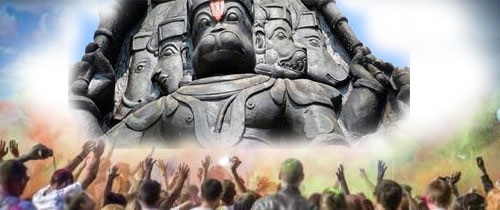
नीलकृत आंजनेयस्तोत्रम्
Hymns of Praise of Āñjanēya by Nīla
(Nīlakŗta Āñjanēya Stōtram)
ओं जय जय । श्री आंजनेय। केसरीप्रियनंदन।
वायुकुमार ईश्वरपुत्र। पार्वतीगर्भसंभूत। वानरनायक।
सकलवेदशास्त्रपारग। संजीविपर्वतोत्पाटन।
लक्ष्मणप्राणरक्षक। गुहप्राणदायक। सीता दु:खनिवारण।
धान्यमालीशापविमोचन। दुर्दंडीबंधविमोचन।
नीलमेघराज्यदायक। सुग्रीवराज्यदायक। भीमसेनाग्रज।
धनंजय ध्वजवाहन। कालनेमिसंहार मैरावणमर्दन।
वृत्रासुरभंजन। सप्त मंत्रिसुतध्वंसन। इंद्रजिद्वधकारण।
अक्षकुमारसंहार। लंखिणी भंजन। रावणमर्दन।
कुम्भकर्णवधपरायण। जंबुमालिनिषूदन। वालिनिबर्हण।
राक्षसकुल दाहन। अशोकवनदाहन। लंकादाहक़। शतमुखपधाण।
सप्तसागरवालसेतुबंधन। निराकारनिर्गुण सगुणस्वरूप।
हेमवर्ण पीतांबरधर। सुवर्चलाप्राणनायक। त्रय
त्रिंशत्कोट्यर्बुदरुद्रगणपोषक। भक्तपालनचतुर।
कनककुंडलाभरण रत्नकिरीटहारनूपुरशोभित।
रामभक्तितत्पर। हेमरंभावनविहार। वक्षतांकितमेघवाहन।
नीलमेघश्याम। सूक्ष्मकाय। महाकाय। बालसूर्यग्रसन।
ऋष्यमूकगिरिनिवासक। मेरुपीठकार्चन। द्वात्रिंशदायुधधर।
चित्रवर्ण। विचित्रसृष्टि निर्माणकर्तृ। अनंतनाम।
दशावतार। अघटनघटनासमर्थ। अनंत ब्रह्मान्। नायक।
दुर्जनसंहार। सुजनरक्षक। देवेंद्रवंदित। सकललोकाराध्य।
सत्यसंकल्प। भक्तसंकल्पपूरक। अतिसुकुमारदेह।
अकर्दमविनोदलेपन। कोटिमन्मथाकार। रणकेलिमर्दन।
विजृम्भमाणसकललोककुक्षिंभर।
सप्तकाेि टमहामंत्रतंत्रस्वरूप।
भूतप्रेतपिशाचशाकिनीढाकिनीविध्वंसन। शिवलिंग
प्रतिष्ठापनकारण। दुष्कर्मविमोचन। दौर्भाग्यनाशन।
ज्वरादि सकलरोगहर। भुक्तिमुक्तिदायक।
कपटनाटकसूत्रधारी। तलाविनोदांकित। कल्याणपरिपूर्ण।
मंगलप्रद। गानलोल। गानप्रिय। अष्टांगयोगनिपुण।
सकलविद्यापारीण। आदिमध्यांतरहित। यज्ञकर्तृ।
यज्ञभोक्त्रु। षण्मतवैभवसानुभूतिचतुर। सकललोकातीत।
विश्वंभर। विश्वमूर्ते। विश्वाकार। दयास्वरूप।
दासजनह्रुदयकमलविहार। मनोवेगगमन। भावज्ञनिपुण।
ऋषिगणगेय। भक्तमनोरथदायक। भक्तवत्सल।
दीनपोषक। दीनमंदार। सर्वस्वतंत्र। शरणागतरक्षक।
आर्तत्राणपरायण। एक असहायवीर। हनुमन् विजयी
भव। दिग्विजयी भव। दिग्विजयी भव।
Note:
* Words separated for ease of reading; Precede reciting each name with “Ōmm”
** Approximate meaning in English; Precede each name with “Oh!”
| In Dēvanāgari Script | In Roman script* | Meaning** |
| ओं जय जय | Ōmm Jaya Jaya! | Ōmm Victory! Victory! |
| श्री आंजनेय | Srī Āñjanēya! | Oh! Respected son of Āñjana |
| केसरीप्रियनंदन | Kēsśrī priyanandana! | Dear son of Kēsśrī |
| वायुकुमार | Vāyu kumāra! | Son of Wind God |
| ईश्वरपुत्र | Īśwara putra! | Son of the very Supreme God |
| पार्वतीगर्भसंभूत | Pārvatīgarbha sambhūta! | One born to Pārvatī |
| वानरनायक | Vānara nāyaka! | Leader of the monkey clan |
| सकलवेदशास्त्रपारग | Sakala Vēdaśāstra pāraga! | Adept in all Vedic sciences |
| संजीविपर्वतोत्पाटन | Sanjīvi parvtōtpāţana! | Up-rooter of Mount Sanjīvi |
| लक्ष्मणप्राणरक्षक | Lakşmaņa prāņarakşaka! | Saver of Lakşmaņa’s life |
| गुहप्राणदायक | Guha prāņadāyaka! | Giver of life to Guha |
| सीता दु:खनिवारण | Sītā duhkha nivāraņa! | Remover of the grief of Sītā |
| धान्यमालीशापविमोचन | Dhānyamālī śāpavimōcana! | Liberator of Dhānyamālī’s (one of Rāvaņa’s wives) curse |
| दुर्दंडीबंधविमोचन | Durdandī bandha vimocana! | Remover of bonds of Durdandī (wife of demon Myrāvaņa, killed by Hanumān) |
| नीलमेघराज्यदायक | Nīlamēgha rājyadāyaka! | Giver of kingdom to Nīlamēgha (the blue sky coloured devotee) |
| सुग्रीवराज्यदायक | Sugrīva rājyadāyaka! | Giver of kingdom to Sugrīva |
| भीमसेनाग्रज | Bhīmasēnāgraja! | Elder brother of Bhīma (2nd Pāndava) |
| धनंजय ध्वजवाहन | Dhananjaya dhwajavāhana! | Rider of the flag of Arjuna (3rd Pāndava) |
| कालनेमिसंहार | Kalanēmi samhāra! | Killer of demon Kalanēmi |
| मैरावणमर्दन | Mairāvaņa mardana! | Destroyer of demon Mairāvaņa |
| वृत्रासुरभंजन | Vŗtrāsura bhanjana! | Destroyer of demon Vŗtrāsura |
| सप्त मंत्रिसुतध्वंसन | Sapta mantrisuta dhwansana! | Destroyer of Saptamantri’s demon sons |
| इंद्रजिद्वधकारण | Indraji dhwadhakaraņa! | Instrumental in killing Indrajit (the eldest son of Rāvaņa) |
| अक्षकुमारसंहार | Akşakumāra samhāra! | Killer of Akşakumāra (a son of Rāvaņa) |
| लंखिणी भंजन | Lankhiņī bhanjana! | Destroyer of Lankhiņī (Guardess of Lanka) |
| रावणमर्दन | Rāvaņa mardana! | Instrumental in destruction of Rāvaņa |
| कुम्भकर्णवधपरायण | Kumbhakarņa vadhaparāyaņa! | Intent on destruction of Kumbhakarņa |
| जंबुमालिनिषूदन | Jambumāli nişūdana! | Killer of Jambumāli (demon warrior) |
| वालिनिबर्हण | Vālinibarharaņa! | Stopper of Vāli (ruler of Kişkinda) |
| राक्षसकुल दाहन | Rakşasakula dahana! | Scorcher of the demon clan |
| अशोकवनदाहन | Aśōkavana vidarana! | Breaker asunder of Aśōka garden |
| लंकादाहक़ | Lankā dāhaka! | Scorcher of Lanka |
| शतमुखपधाण | Satamukhavadha kāraņa! | Cause of killing Satamukha, the 100-faced demon |
| सप्तसागरवालसेतुबंधन | Saptasāgara vālasētu bandhana! | Joiner of the Seven Seas with his tail as bridge |
| निराकारनिर्गुण सगुणस्वरूप | Nirākāra nirguņa saguņa swarūpa! | Shapeless and attribute less, yet with a form of good qualities |
| हेमवर्ण पीतांबरधर | Hēmavarņa pītāmbara! | Draped in golden coloured silks |
| सुवर्चलाप्राणनायक | Suvarcchalā prāņanāyaka! | Dear life of Suvarcchalā (Sun’s daughter, Hanumān’s wife) |
| त्रय त्रिंशत्कोट्यर्बुदरुद्रगणपोषक | Trayastrimsatkō tyarbuda rudragaņapōşaka! | Keeper of 33 billion billions of Rudra (Śiva) followers |
| भक्तपालनचतुर | Bhaktapālana catura! | Adept in protecting devotees |
| कनककुंडलाभरण रत्नकिरीटहारनूपुरशोभित | Ratna kirītahāra nūpura śōbhita! | Resplendent in diamond studded crown, chain and anklet |
| रामभक्तितत्पर | Rāmabhaktitatpra! | Ardent devotee of Śrīrāma |
| हेमरंभावनविहार | Hēmarambhavana vihara! | Stroller amidst golden banana groves |
| वक्षतांकितमेघवाहन | Vakştānkita mēghavāhaka! | Carrier of clouds on thes chest |
| नीलमेघश्याम | Nīlamēghaśyāma! | Dark blue complexioned one |
| सूक्ष्मकाय | Sūkşmakāya! | Minute bodied one |
| महाकाय | Mahākāya! | Mammoth bodied one |
| बालसूर्यग्रसन | Bālasūrayagrasana! | Intent on swallowing the raising Sun |
| ऋष्यमूकगिरिनिवासक | Ŗşyamūkagiri nivāsaka! | Dweller of the Ŗşyamūka hill |
| मेरुपीठकार्चन | Mēru pīţhakārcana! | Worshipper of the table of Mount Mēru |
| द्वात्रिंशदायुधधर | Dwitrimsa dāyudhadhara! | Wearer of 32 weapons |
| चित्रवर्ण | Citravarņa! | One with strange complexion |
| विचित्रसृष्टि निर्माणकर्तृ | Vicitrasristi nirmānakarta! | Builder of wonder creations |
| अनंतनाम | Anantanāma! | One with infinite names |
| दशावतार | Daśāvatāra! | One with 10 incarnations |
| अघटनघटनासमर्थ | Aghatanaghatanā samartha! | One capable of doing the impossible |
| अनंत ब्रह्मान् | Ananta brāhman! | The eternal Supreme Being |
| नायक | Nāyaka! | Leader |
| दुर्जनसंहार | Durjanasamhāra! | Destroyer of evil ones |
| सुजनरक्षक | Sujanaraksaka! | Protector of good ones |
| देवेंद्रवंदित | Dēvēndravandita! | Revered by Dēvēndra himself |
| सकललोकाराध्य | Sakalalōkāradhya! | One worshipped by all worlds |
| सत्यसंकल्प | Satyasankalpa! | One bound to truth |
| भक्तसंकल्पपूरक | Bhaktasankalpa pūraka! | Fulfiller of wiahes of devotees |
| अतिसुकुमारदेह | Atisukumāradēha! | One with a tender body |
| अकर्दमविनोदलेपन | Akardamavinōda lēpana! | Applier of mud on body for fun |
| कोटिमन्मथाकार | Kōtimanmadhākara! | One with the form like that of 10 million cupids |
| रणकेलिमर्दन | Ranakēlimardhana! | Adept at all types of war |
| विजृम्भमाणसकललोककुक्षिंभर | Vijŗumbhamāņa sakalalōkakukşimbhara! | Ever open to fill the stomachs of all that are hungry |
| सप्तकाेि टमहामंत्रतंत्रस्वरूप | Saptakōti mahāmantra tantra swarūpa! | The very form of 70 million sacred hymns and rituals |
| भूतप्रेतपिशाचशाकिनीढाकिनीविध्वंसन | Bhūtaprētapiśācasākinī dhakinīvidhwamsana! | Destroyer of spirits, ghosts, demons, etc. |
| शिवलिंग प्रतिष्ठापनकारण | Śivalinga pratisţhapana kāraņa! | Instrumental in establishing the phallus (linga) form of Śiva |
| दुष्कर्मविमोचन | Duşkarmavimōcana! | Reliever from bad deeds |
| दौर्भाग्यनाशन | Daurbhāgya naśana! | Destroyer of bad times |
| ज्वरादि सकलरोगहर | Jwarādisakalarōgahara! | Remover of fever and all other diseases |
| भुक्तिमुक्तिदायक | Bhukti mukti dāyaka! | Giver of food as well as freedom |
| कपटनाटकसूत्रधारी | Kapatanātaka sūtradhāri! | Stage-manager for all deceptive ways (of doings for success) |
| तलाविनोदांकित | Talāvinōdāñkita! | Adept at fighting with bare palms |
| कल्याणपरिपूर्ण | Kalyāņaparipūrņa! | One full with auspicious things |
| मंगलप्रद | Mangaļaprada! | One that is always auspicious |
| गानप्रिय | Gānapriya! | Lover of singing |
| अष्टांगयोगनिपुण | Aştañgayōga nipuņa! | Expert in Aştañgayōga postures |
| सकलविद्यापारीण | Sakalavidyā pārīņa! | Adept in all schools of knowledge |
| आदिमध्यांतरहित | Ādimadhyāntarahita! | One with no beginning and end |
| यज्ञकर्तृ | Yagñyakarta! | One who performs holy fire rituals |
| यज्ञभोक्त्रु | Yagñyabhokta! | Beneficiery of holy fire rituals |
| षण्मतवैभवसानुभूतिचतुर | Şanmata vaibhavasānubhūti catura! | Wise supporter of the greatness of all seven types of faith |
| सकललोकातीत | Sakala lōkātīta! | Dear to all the worlds |
| विश्वंभर | Viśvambhara! | Maintainer of the universe |
| विश्वमूर्ते | Viśvamūrte! | Very picture/idol of the universe |
| विश्वाकार | Viśvākāra! | Very form of the universe |
| दयास्वरूप | Dayāswarūpa! | Very form of kindness |
| दासजनह्रुदयकमलविहार | Dāsajana hŗdayakamala vihāra! | One who visits the hearts of devotees |
| मनोवेगगमन | Manōvēga gamana! | Mover with the speed of thought |
| भावज्ञनिपुण | Bhāvagñya nipuņa! | Adept in understanding feelings |
| ऋषिगणगेय | Ŗşigaņagēya! | Extolled by sages |
| भक्तमनोरथदायक | Bhaktamanōradha dāyaka! | Fulfiller of the wishes of devotees |
| भक्तवत्सल | Bhaktavatsala! | Dearest to devotees |
| दीनपोषक | Dīnapōşaka! | Provider to the unfortunates |
| दीनमंदार | Dīnamandāra! | Shining blossom to depressed souls |
| सर्वस्वतंत्र | Sarvaswatantra! | Always free of everything |
| शरणागतरक्षक | Śaraņāgatarakşaka! | Protector of asylum seekers |
| आर्तत्राणपरायण | Ārtatrāņa parāyaņa! | Ever ready to protect the troubled |
| एक असहायवीर हनुमन् | Ēka asahāyavīra! Hanumān! | The only rescuer of helpless, Hanumān |
| विजयी भव | Vijayībhava! | Be victorious |
| दिग्विजयी भव | Digvijayībhava! | Be doubly victorious |
| दिग्विजयी भव | Digvijayībhava! | Be doubly victorious |
इति श्रीपराशरसंहिताया: पंचमुखहनुमन्मन्त्रविवरणे पराशरमैत्रेयसंवादे आंजनेयस्तोत्रकथननामचतुर्थपटल:।
Thus ends the 4th Chapter, entitled “History of Sōmadatta – Hymns of Praise of Āñjanēya by Nīla” of Śrī Parāśara Samhitā
![]()
Devanagari transliteration

Click here to visit the Contents of the Part 1.
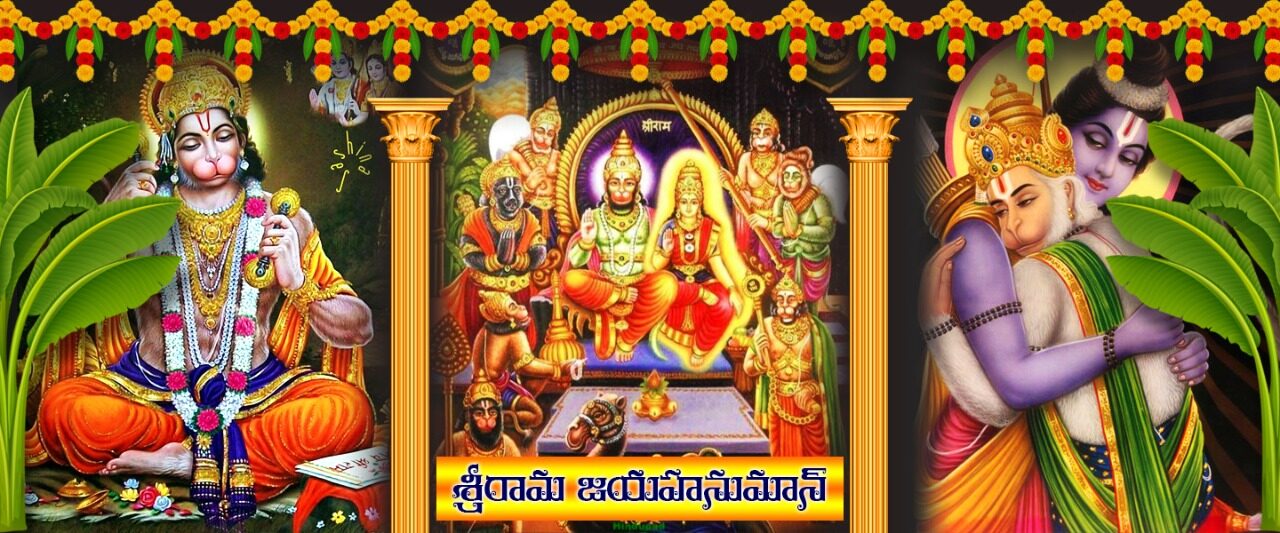
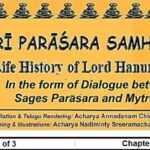
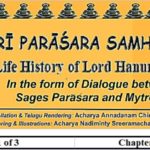

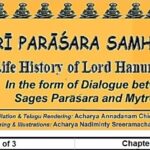
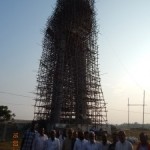
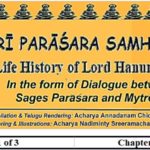
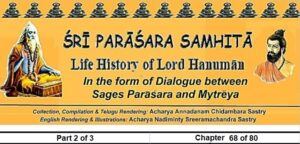
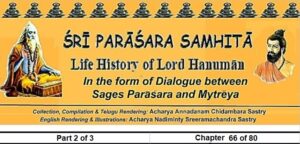
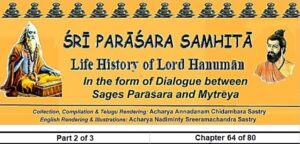
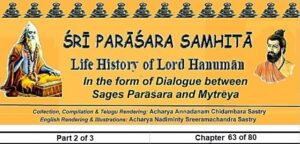
Be First to Comment